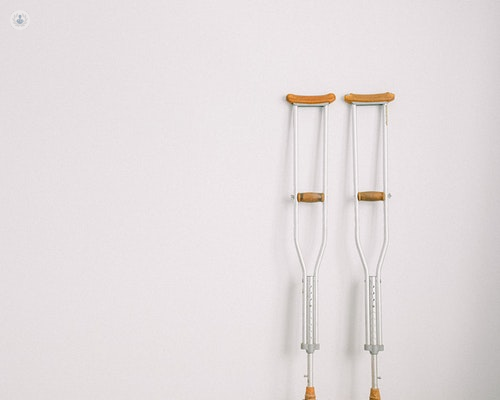Frequently asked questions about hip replacement
Escrito por:Mr Araz Massraf, a highly regarded consultant trauma and orthopaedic surgeon, answers some of the key questions regarding hip replacement surgery, including how to sleep after, foods to avoid and returning to activity.

How soon after hip replacement surgery is a patient discharged?
Patients are usually discharged 2-3 days after hip replacement surgery, although some are able to go home the same day or the day after.
How can a patient minimise risk of infection after the surgery?
Before discharge, your surgeon will prescribe antibiotics which will help you fight infection. It’s extremely important that the wound is kept clean and dry, as this will also minimise the risk of it becoming infected. After the operation, some patients may have superficial wound irritation, but this will be checked by your surgeon at the time.
How long after the surgery can you take a shower or bath?
Most patients are able to have a shower or bath after a day or two. Generally speaking, it should be fine once you are discharged from hospital. However, it’s important to keep the wound dry.
How to sleep after hip replacement surgery
It is vitally important that you sleep on your back for 6 weeks after hip replacement surgery to aid recovery. You must also try not to lie on the wound until it has healed and sealed, although this can be difficult depending on the type and location of the wound. Your surgeon will give you advice on how to sleep after surgery and it must be followed as closely as possible.
Which pain killers are prescribed for recovery?
Before the operation, local anaesthetic is administered through an intraarticular entrance point, which is also used to administer agents that reduce bleeding and swelling. Strong painkillers may also be prescribed, but it’s important not to take too many as they can impact movement which will slow recovery down.
Foods to eat and avoid after recovery
After hip surgery, it is recommended that patients follow a healthy diet, while staying hydrated with plenty of fluids. Patients should avoid alcohol consumption, as well as food s which can provoke bowel movement. This is important because many of the painkillers prescribed after this kind of operation cause abnormal bowel movements, so provoking further movements through your diet can cause great discomfort and slow recovery. A fibre rich diet will help keep bowel movements consistent and ensure you don’t get constipated.
Does the patient’s weight have an effect on recovery?
Yes, patients with a high BMI will have more difficulty recovering from this type of surgery, so it is recommended that overweight or obese patients try to lose any excess weight before undergoing this procedure. After the surgery, it is vital that patients keep mobilising to relieve tight, painful muscles.
How soon after the procedure can you drive?
Usually, patients experience swelling in one or both legs for 6-8 weeks, due to the effects of anti-blood clotting medication. For this reason, it is recommended that patients refrain from driving for the first 6 weeks or as long as it takes for the swelling to subside. After this period, you should make sure you are fit to drive by practicing the movements (including the emergency stop manoeuvre) in a stationary car, and only return to driving once you are completely comfortable with these movements. Generally, most patients are fit to drive once they are able to walk without assistance.
Will I be given crutches after hip replacement surgery?
Yes, it is recommended that patients use both crutches for the first week or two post-surgery, after which you should be able to move around the house using just one. After 4 weeks you should be able to walk inside without crutches, using furniture to help you if necessary. Some patients need or prefer to use at least one crutch outside for 6-8 weeks, to reduce to risk of tripping or falling and damaging the hip.
When can you return to exercise?
Once the procedure has been completed, your surgeon will provide you with instructions and leaflets to clearly outline what you need to do. It’s important to follow all instructions, as well as advice from your assigned physiotherapist, to aid your recovery.
The recommended exercises are vital as they will release the tension in your stiff muscles (They naturally stiffen after surgery), which will ease pain and help you regain your range of movement.
Mr Massraf is a consultant orthopaedic surgeon in Peterborough, Kettering and Boston. He is an expert in hip replacement, knee surgery and sports injuries. Visit his Top Doctors profile to request an appointment with him.


